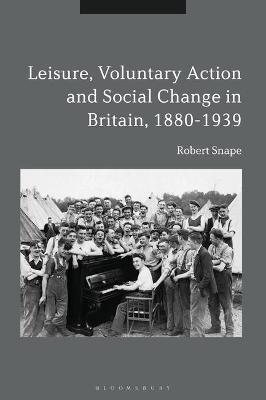
Leisure, Voluntary Action and Social Change in Britain, 1880-1939
Bloomsbury Academic (Verlag)
978-1-350-00301-9 (ISBN)
This volume documents the parallel cultural shift from charitable philanthropy to social service and from rational recreation to leisure, teasing out intellectual influences which included social idealism, liberalism and socialism. Leisure, Robert Snape claims, has been a central and under-recognized organizing force in British communities.
Leisure, Voluntary Action and Social Change in Britain, 1880-1939 marks a much needed addition to the historiography of leisure and an antidote to the widely misunderstood implications of leisure to social policy today.
Robert Snape is Head of the Centre for Worktown Studies and Reader in Leisure and Sport at the University of Bolton, UK.
Introduction
1.1 Historicizing Leisure, Voluntary Action and Social Change
1.2 Leisure and Community
1.3 Leisure, Voluntary Action and Civil Society
1.4 Overview of Content
2. Associational Leisure and the Formation of Community in the Mid- Nineteenth Century
2.1 Introduction
2.2 Industrialization, Urbanization and Community
2.3 Leisure in Mutual Association
2.4 Temperance, Leisure and Community
2.5 Working-Men’s Clubs
2.6 Conclusion
3. Evangelicalism and the Inner Mission: Religion, Leisure and Social Service
3.1 Religion, the Social Mission and Leisure
3.2 Towards Social Service: John Brown Paton, Leisure and the Inner Mission
3.3 Conclusion
4. Leisure, Community and the Settlement Movement
4.1 Introduction
4.2 The Barnetts and Toynbee Hall
4.3 Oxford House and the Public School Mission
4.4 The Liverpool University Settlement
4.5 The Settlement Movement, Social Work and Leisure
5. Utopian and Radical Leisure Communities
5.1 Introduction
5.2 The Clarion Movement
5.3. The Co-operative Movement
6. Leisure in Inter-War Britain
7. Theorizations of Leisure and Voluntarism in post -First World War Social Reconstruction
7.1 Introduction
7.2 Leisure in the New Society
7.3 New Leisure Makes New Men
7.4 Leisure, Modernity and Social Change
7.5 Conclusion
8. Social Service, Reconstruction and Leisure
8.1 Introduction
8.2 The National Council of Social Service – Leisure and Community Well-Being
8.3 Re-constructing the Rural Community: Leisure, Village Halls and Folk Dance
8.4 The New Estates and Community Centres
9. Young People, Youth Organizations and Leisure
9.1 Introduction
9.2 Leisure, Young People and Industrial Welfare in the First World War
9.3 Educating the Young Citizen
9.4 Cultural Rebels and Radical Leisure Association
10. Leisure, Unemployment and Social Service
10.1 Introduction
10.2 Unemployment, Leisure and Social Capital
11. Work-Based Leisure Communities
11.1 Work, Leisure and Community in Inter-War Britain
11.2 The Workplace as a Social Community
11.3 Model Industrial Villages and Leisure
11.4 Leisure and Industrial Welfare in Inter-war Britain
11.5 Co-operative and Collective Alternatives to Welfare
11.6 Conclusion
Conclusions
Select Bibliography
Index
| Erscheinungsdatum | 13.06.2018 |
|---|---|
| Zusatzinfo | 10 bw illus |
| Verlagsort | London |
| Sprache | englisch |
| Maße | 156 x 234 mm |
| Gewicht | 540 g |
| Themenwelt | Geisteswissenschaften ► Geschichte ► Regional- / Ländergeschichte |
| Geschichte ► Teilgebiete der Geschichte ► Kulturgeschichte | |
| Geschichte ► Teilgebiete der Geschichte ► Sozialgeschichte | |
| Geisteswissenschaften ► Religion / Theologie | |
| Sozialwissenschaften ► Politik / Verwaltung ► Staat / Verwaltung | |
| Sozialwissenschaften ► Soziologie ► Mikrosoziologie | |
| Weitere Fachgebiete ► Sportwissenschaft | |
| ISBN-10 | 1-350-00301-8 / 1350003018 |
| ISBN-13 | 978-1-350-00301-9 / 9781350003019 |
| Zustand | Neuware |
| Informationen gemäß Produktsicherheitsverordnung (GPSR) | |
| Haben Sie eine Frage zum Produkt? |
aus dem Bereich


